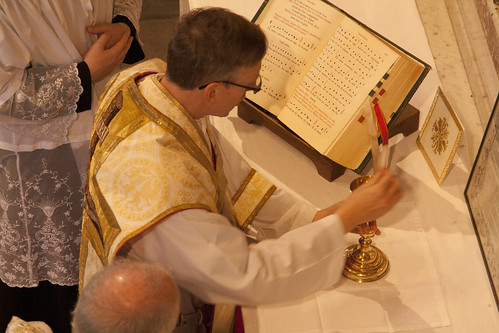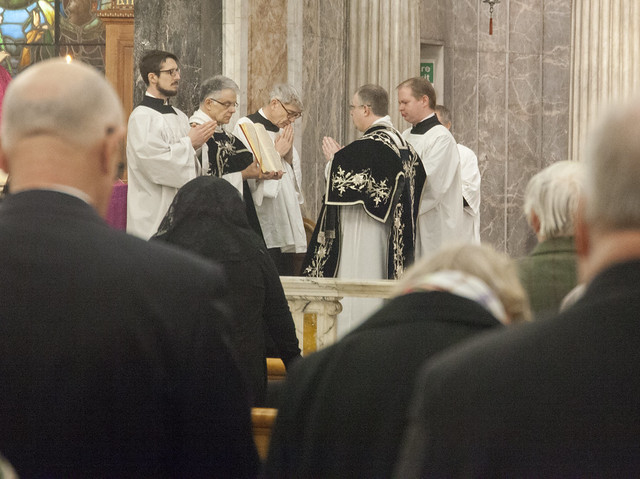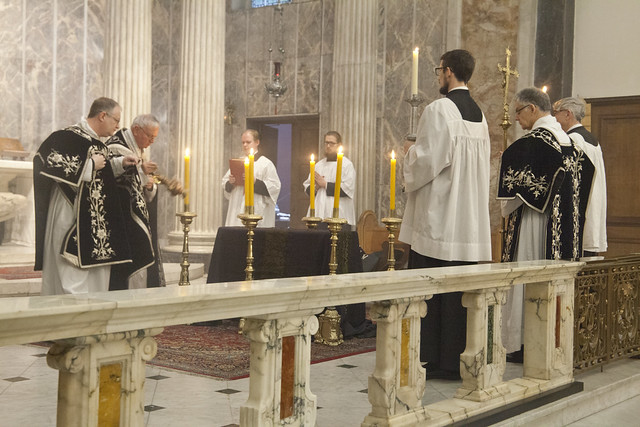Chairman's Blog
LMS Statement on the Coronavirus and Holy Communion
STATEMENT ON COVID-19 (CORONAVIRUS) AND THE RECEPTION OF HOLY COMMUNION AT CELEBRATIONS OF THE MASS ACCORDING TO THE EXTRAORDINARY FORM,
When giving communion in the hand seek to ensure you place the host in the hand of the recipient in such a way that you do not touch their hands.
In the same spirit the distribution of the Host on the tongue should never involve the touching of the communicant’s tongue by the priest.
Further information
My Jesus, I believe that thou art present in the Most Holy Sacrament. I love thee above all things, and I desire to receive thee in my soul. Since I cannot at this moment receive thee sacramentally, come at least spiritually into my heart. I embrace thee as if thou wert already there, and unite myself wholly to thee. Never permit me to be separated from thee. Amen.
The Latin Mass Society
The Latin Mass Society, founded in 1965, is an association of Catholic faithful dedicated to the promotion of the traditional Latin liturgy of the Catholic Church, the teachings and practices integral to it, the musical tradition which serves it, and the Latin language in which it is celebrated.
Traditional Mass in Campion Hall
 On Thursday 20th the first public Traditional Mass was sung in the chapel of Campion Hall, Oxford.
On Thursday 20th the first public Traditional Mass was sung in the chapel of Campion Hall, Oxford.
Campion Hall is the Jesuit house of studies, a Permanent Private Hall, in the University of Oxford. The building, including the fine chapel, was designed by Lutyens.
Mass was celebrated by Fr Joseph Hamilon, an American priest doing studies in Oxford and a regular celebrant of the Traditional Mass at the Oxford Oratory.
Fr Joseph Simmons SJ preached.
The Mass was organised by the Newman Society - Oxford's student Catholic society.
The Mass was accompanied with chant and polyphony by a group led by Dominic Bevan. It was a Votive Mass of the Holy Spirit.
New CTS booklet on the Traditional Mass
 A new booklet from the Catholic Truth Society is coming out on the Traditional Mass. It is available for pre-order now and will launch on 3rd April. It is the standard pocket-sized CTS production, and priced at £3.50.
A new booklet from the Catholic Truth Society is coming out on the Traditional Mass. It is available for pre-order now and will launch on 3rd April. It is the standard pocket-sized CTS production, and priced at £3.50.
It is by me. Here is a little excerpt:
Requiem for Colin Mawby: photos
Last Saturday Mgr Gordon Read, National Chaplain of the Latin Mass Society, celebrated a High Mass of Requiem for the late composer Colin Mawby, who had been a Patron of the Society.
It took place in St Mary Moorfields in the City of London.
It was accompanied by Cantus Magnus under Matthew Schellhorn, with Officium Defunctorum by Victoria, and two motets by Colin Mawby: Jesu dulcis memoria and Hodie nobis de cœlo.
Matthew Schellhorn the LMS Director of Music with some of the singers, who had been choristers at Westminster Cathedral.
Sunday Masses in Holy Trinity, Hethe
We have had some lovely Sung Traditional Masses in this historic church--the oldest Catholic parish church in Oxford, founded in 1839. And these will continue in 2020!
22nd March, Laetare Sunday
Spring 2020 Mass of Ages available
 In this issue: • We feature the Pontifical High Mass at Birmingham Oratory in thanksgiving for the Canonisation of St John Henry Newman • Joseph Shaw finds no evidence to support the idea that traditionally minded Catholics are 'rigid' • Fr Armand de Malleray FSSP reports on the success of the Priory Campaign • Charles A. Coulombe shows how the British Empire helped spread the Faith • Henry Walker is inspired by the number of young people attending the Traditional Mass • Barbara Kay reports on a visit to a new hybrid education venture in Bedfordshire • Jeremy Boot introduces a Muslim colleague to the beauties of the Traditional Mass.
In this issue: • We feature the Pontifical High Mass at Birmingham Oratory in thanksgiving for the Canonisation of St John Henry Newman • Joseph Shaw finds no evidence to support the idea that traditionally minded Catholics are 'rigid' • Fr Armand de Malleray FSSP reports on the success of the Priory Campaign • Charles A. Coulombe shows how the British Empire helped spread the Faith • Henry Walker is inspired by the number of young people attending the Traditional Mass • Barbara Kay reports on a visit to a new hybrid education venture in Bedfordshire • Jeremy Boot introduces a Muslim colleague to the beauties of the Traditional Mass.
Copies are mailed to members and available in many churches around the country for free: or get one here.
The liturgical reform and 'the missions'
SIR – It was with great joy and interest that I read Daniel Dolley’s article on “how to evangelise the Amazon” (Cover story, January 24).
Dr Dolley’s point that the Amazon communities are more traditional in their approach to gender roles, religion and ritual action than those who advocate on their behalf is also valid for the Karen communities in northern Thailand, where I did my own ethnographic fieldwork for my DPhil in International Development.
I lived for a total of 12 months in a Catholic Karen village in Chiang Mai province. An elderly French missionary priest was responsible for the village church and the community appreciated his liturgical correctness. There were daily Masses and morning prayer and weekly rosaries and Stations of the Cross during Lent. The women in the village formed a Legio Mariae group and most households had holy water at home.
The village elders started to become Catholics in the 1950s and spiritual protection was – just like for the Amazon people – a major reason for conversion.
During my stay, villagers told me several times that they preferred priests who wore proper vestments, including an alb, to those who just use a stole for celebrating Mass. A good liturgy and the correct vestments gave the religious service the dignity that the Karen expected from sacred rites. Indeed, like the Amazon people Dr Dolley wrote about, the Karen people in Thailand did not find it difficult to engage with the traditional rituals of the Church.
Perceiving this parallel between the Amazon people and the Karen of northern Thailand highlights to me the global dimension of the issue at stake, ie how the Church can best serve indigenous peoples around the world.
The usefulness of Latin
 |
| Mass during the LMS Priest-training Conference in Prior Park. |
Reply to Prof Healy in Homiletic and Pastoral Review
 |
| Low Mass in the Slipper Chapel at Walsingham, England |
Professor Mary Healy, a member of the Pontifical Biblical Commission, recently wrote a piece for the Homiletic and Pastoral Review on the 50th Anniversary of the Novus Ordo Missae: the 'Ordinary Form'. She wrote:
It has become common to blame today’s lack of Eucharistic faith and fervor on the revised rite. Critics rightly point to certain weaknesses such as collects that are less expressive of God’s majesty, and the omission of important biblical texts from the lectionary. Another unfortunate change is the elimination of the Octave of Pentecost, giving the impression of downgrading the great solemnity that culminates the Easter season. The primary problem, however, is not the reformed rite itself but its flawed implementation, due to poor — and, in some cases, catastrophically defective — theological and spiritual preparation among clergy and laity alike. Too often, the liturgical changes were accompanied by a downplaying of the notion of sacredness. A casual attitude toward the liturgy was fostered, and beautiful churches were “wreckovated.” Lukewarm liturgy has, tragically, obscured the authentic renewal called for by the Council itself.
I found this very encouraging, in the sense that it represents a big advance on the anti-Old Mass polemic one might have expected in a mainstream organ like the Homiletic and Pastoral Review. Official and establishment publications would until recently have thought unstinting praise for the reform would be compulsory, with just a nod towards the problem of liturgical abuses. Prof Healy agrees that criticisms of core aspects of the reform such as the collects are actually justified, and though this is not made explicit, the implication is that she also accepts that the liturgical reform has played a role in 'today's lack of Eucharistic faith and fervor', even if the 'primary' driver is the issue of implementation and abuses.
It is admittedly difficult to quantify the effect of different factors, but it seems to me that this is a defensible claim: that the abuses/ 'implementation' issues of ad-libbing, invalid matter, female altar servers, communion in the hand, the complete elimination of Latin and traditional sacred music, terrible English translations, and the wrecking of churches to make 'versus populum' celebration possible, had at least slightly more negative effect on the eucharistic faith of the people than the changes to the collects, lectionary, signs of reverence, and the loss of so many beautiful and expressive ceremonies.
Even if we disagree, this is a pretty interesting discussion to be having 50 years after Pope Paul VI promulgated the reformed missal. We have truly come a long way.
Healy goes on, nevertheless, to assert the superiority of the Ordinary Form in a number of respects, and I have responded to her points in a piece now also published in the Homelitic and Pastoral Review. I am delighted that they given house-room to a debate such as this, and I hope readers find it interesting.
You can read my article here.
Support the Latin Mass Society
The peoples of the Amazon need Christ
My latest on LifeSite, inspired by the cover article in the Catholic Herald by Dr Daniel Dolley the other week.
----------------------
The ancient Greek historian Herodotus records a story about a young man who caused the accidental death of his brother. Fleeing from home, he was taken in by a king who performed the necessary rite of purification and took him into his own household. One day, out hunting with the king’s son, the young man accidentally caused the prince’s death. In despair, he took his own life.
What is the moral of this story? The king’s act of kindness was misjudged; the rite of purification was not sufficiently powerful; those whom the gods have chosen to afflict cannot be helped. Perhaps the young man had inadvertently offended some deity, a common occurrence in Greek myth. You can’t be too careful: Works and Days by Hesiod attempts to summarize omens and auspicious and inauspicious days for everything from getting married to planting beans. The result is a mind-boggling collection of material that, if taken seriously, would control one’s every action, with no guarantee of success. This is what life under paganism was like in ancient Europe, and it was to this world that the Church’s sacraments and spirituality were first directed.
Support the Latin Mass Society









